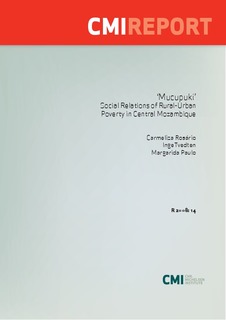| dc.contributor.author | Rosário, Carmeliza | |
| dc.contributor.author | Tvedten, Inge | |
| dc.contributor.author | Paulo, Margarido | |
| dc.date.accessioned | 2009-12-02T09:12:57Z | |
| dc.date.accessioned | 2017-03-29T09:13:12Z | |
| dc.date.available | 2009-12-02T09:12:57Z | |
| dc.date.available | 2017-03-29T09:13:12Z | |
| dc.date.issued | 2008 | |
| dc.identifier.isbn | 978-82-8062-350-8 | |
| dc.identifier.issn | 1890-503X | |
| dc.identifier.uri | http://hdl.handle.net/11250/2436060 | |
| dc.description.abstract | This is the third in a series of six qualitative studies monitoring and evaluating Mozambique’s Poverty Reduction Strategy, PARPA. Many communities in Mozambique find themselves in the rural-urban interface, either by being small towns or rural settings in the vicinity of cities. There is increasing evidence that households and individuals who manage to establish and maintain rural-urban linkages are those experiencing improved living conditions and upward social mobility, while those being ‘captured’ in rural villages and urban slums are experiencing impoverishment. The apparently increasing inequalities in Mozambican society can only be dealt with by stopping relate to rural and urban areas as separate entities and rather see them as intricately linked together and part of the same social formation. | |
| dc.language.iso | eng | |
| dc.publisher | Chr. Michelsen Institute | |
| dc.relation.ispartofseries | Research report | |
| dc.relation.ispartofseries | R 2008: 14 | |
| dc.subject | Mozambique | |
| dc.subject | Poverty | |
| dc.title | 'Mucupuki'. Social relations of rural-urban poverty in central Mozambique | |
| dc.type | Research report | |
